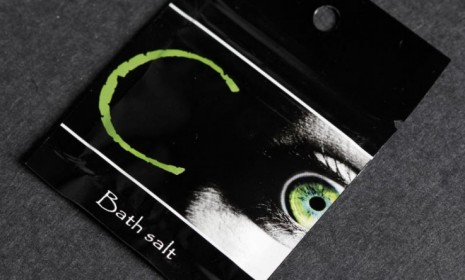Bath salts: The quasi-legal drug allegedly behind Miami's cannibal attack
The dangerous synthetic thought to have played a role in a vicious mauling — of a human, by a human — can be as easy to buy as aspirin

A free daily email with the biggest news stories of the day – and the best features from TheWeek.com
You are now subscribed
Your newsletter sign-up was successful
Authorities suspect that the allegedly deranged attacker who gnawed off 75 percent of a homeless man's face in Miami on Saturday was under the influence of a dangerous yet sometimes legal drug known as "bath salts." Reports suggest that the alleged attacker, 31-year-old Rudy Eugene, was on his way to a friend's house in northwest Miami when his car broke down in the scorching 90 degree heat. He then abandoned the vehicle and stripped off his clothes. At around 2 p.m., Eugene encountered 65-year-old homeless man Ronald Poppo napping, and, for reasons that are unclear, allegedly brutally assaulted him for 18 minutes, viciously tearing at Poppo's flesh with his teeth. Police arrived and repeatedly warned Eugene to stand down before shooting him; Eugene died at the scene. Could bath salts really have been behind the day's gruesome events? Here's what you should know:
What are bath salts?
"These are not the bath salts you buy at Victoria's Secret," Ohio emergency room physician Dr. Howard Mell, who has seen seven cases of bath salt-related deaths this year, tells CBS News. The highly addictive mix of chemicals is often referred to as a "cocaine substitute," and contains synthetic alternatives to stimulants like coke, LSD, PCP, and methamphetamine. The crystals can be snorted, smoked, or injected directly into the bloodstream.
The Week
Escape your echo chamber. Get the facts behind the news, plus analysis from multiple perspectives.

Sign up for The Week's Free Newsletters
From our morning news briefing to a weekly Good News Newsletter, get the best of The Week delivered directly to your inbox.
From our morning news briefing to a weekly Good News Newsletter, get the best of The Week delivered directly to your inbox.
What do bath salts do?
The most common side effects are agitation, fast heart rate, hallucinations, seizures, high blood pressure, and paranoia, according to the CDC. "The psychosis seen in some users is truly remarkable, in a very scary way," Mark Ryan, director of the Louisiana Poison Center, tells Forbes. The stimulant can temporarily give users superhuman strength, in some cases rendering a stun gun or taser ineffective. "People high on these drugs have done some bizarre things," says Ryan.
Where do bath salts come from?
People first began using them in Germany in 2007, and the drug has since made its way to the U.S. Authorities believe bath salts are mainly imported from China. They're sold at gas stations, convenience stores, and head shops in some states, and on the internet under names like "Ivory Wave" and "Bliss." If you know where to look, "they can be as easy to buy as aspirin, right over the counter," says the Sun Sentinel.
A free daily email with the biggest news stories of the day – and the best features from TheWeek.com
Wait — the drug is legal?
Sort of. Last fall the Drug Enforcement Agency instituted an emergency 12-month ban on three common chemicals used to make bath salts: Mephedrone, MDPV, and methylone. And 38 states — including Florida, where the attack took place — have also placed bans on what they term "substituted cathinones." Yet many states don't administer penalties for violations, and experts say the current rules are ineffective. The chemicals used to make bath salts can be "tweaked slightly and classified as a new drug, making it easy to skirt around the law," says Meghan Neal at the New York Daily News.
Okay. But could bath salts really turn someone into a cannibal?
That remains unclear, and an autopsy still needs to be conducted to determine if the drugs were involved in Miami's attack. But there are plenty of other disturbing bath salts stories. After using the drug in 2010, a 21-year-old Louisiana man slashed his own throat, but lived. Then, once he was stitched up, the man shot and killed himself. Another incident involving bath salts in Seattle saw U.S. Army medic David Stewart allegedly kill his wife (who was found to also have balt salts in her system) and 5-year-old son. And last year, poison-control centers tallied more than 6,100 bath salt-related emergencies.
Sources: CBS News, Forbes, New York Daily News, Sun Sentinel, Reuters, TIME, U.S. News
-
 Democrats push for ICE accountability
Democrats push for ICE accountabilityFeature U.S. citizens shot and violently detained by immigration agents testify at Capitol Hill hearing
-
 The price of sporting glory
The price of sporting gloryFeature The Milan-Cortina Winter Olympics kicked off this week. Will Italy regret playing host?
-
 Fulton County: A dress rehearsal for election theft?
Fulton County: A dress rehearsal for election theft?Feature Director of National Intelligence Tulsi Gabbard is Trump's de facto ‘voter fraud’ czar